by Kambale Musavuli
In recognition of Genocide Prevention Month, the permanent mission of the Czech Republic to the United Nations and United to End Genocide organized an event titled “Justice in 2012,” bringing justice seekers from Uganda, Sudan and Congo to share experience as human rights activists in their respective countries, the role of the International Criminal Court, its arrest warrants and the importance of justice for the victims.
Kambale Musavuli, spokesperson of Friends of the Congo, served as one of the speakers and shared why it is important to support justice in the Congo. The event took place at the Bohemian National Hall in New York City on April 30, 2012.
Distinguished guests, diplomats, activists and justice seekers, Good evening.
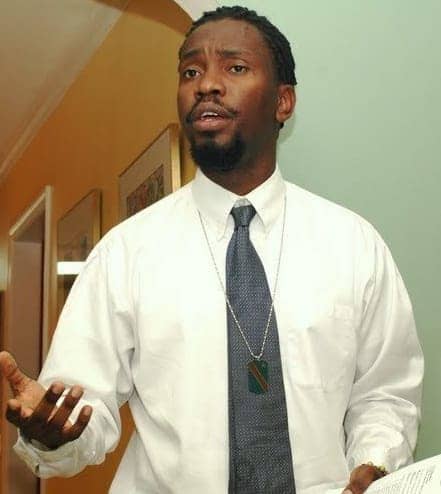 Thank you for inviting Friends of the Congo to participate in the “Justice in 2012” panel in recognition of Genocide Prevention Month.
Thank you for inviting Friends of the Congo to participate in the “Justice in 2012” panel in recognition of Genocide Prevention Month.
I’d like to thank the permanent mission of the Czech Republic to the United Nations and United to End Genocide for hosting this panel discussion. I also would like to thank Staci Alziebler-Perkins, an amazing human rights activist and the New York City Genocide Prevention Coalition Convener, for uniting justice seekers on this last day of Genocide Prevention Month.
I’m delighted to be joined by Mr. Magid Kabash of the Nuba Mountains International Association, who has just returned from the Nuba Mountains and shared with us his personal eyewitness account of what is unfolding there. It is also an honor to be joined by Stephen Lamony of Uganda who also has been a justice seeker at the Coalition for the International Criminal Court.
We are convening tonight to share with you our experience as human rights activists on issues related to our countries. We have been asked to recommend how the ICC can be engaged in our countries, from issuing arrest warrants to providing justice for the victims in our homeland.
This is a daunting task to do in 15 minutes for a Congolese human rights activist such as myself, yet I stand here to share with you the optimum way of supporting the Congolese people who have been fighting to get justice since the beginning of the war in their country in 1996.
My talk will be organized into four sections: the case of Bosco Ntaganda, the United Nations Mapping Exercise Report, Equitable Justice and Recommendations to the ICC.
1. The Prosecutor v. Bosco Ntaganda (ICC-01/04-02/06 – Pre-trial)
According to the ICC arrest warrant, Bosco Ntaganda is allegedly criminally responsible under article 25 (3) (a) of the Rome Statute for three counts of war crimes: enlistment of children under the age of 15; conscription of children under the age of 15; and using children under the age of 15 to participate actively in hostilities. As a deputy chief of the General Staff of the Forces Patriotiques pour la Libération du Congo (FPLC, the military wing of the Union des Patriotes Congolais of Thomas Lubanga), Bosco Ntaganda is accused of having used his authority to implement the FPLC’s policy regarding the enlistment and conscription of children under 15 and of having involved them actively in the hostilities in Ituri from July 2002 to December 2003.
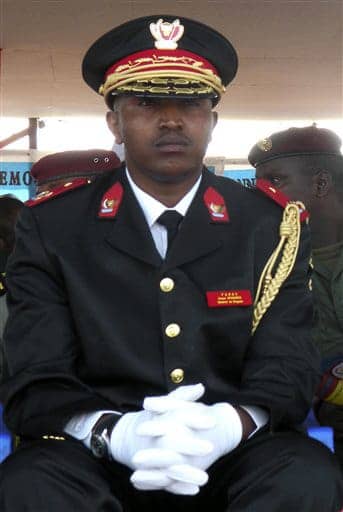 Ntaganda is further accused of having exercised de jure and de facto authority in the Bule, Centrale, Mandro, Rwampara, Irumu, Bogoro and Sota child soldier training camps. Finally, he is also accused of having taken part in FPLC attacks in which child soldiers were involved. As you know, Ntaganda’s colleague in FPLC, Thomas Lubanga, has been found guilty by the ICC of recruiting and using child soldiers in the Congo between 2002 and 2003.
Ntaganda is further accused of having exercised de jure and de facto authority in the Bule, Centrale, Mandro, Rwampara, Irumu, Bogoro and Sota child soldier training camps. Finally, he is also accused of having taken part in FPLC attacks in which child soldiers were involved. As you know, Ntaganda’s colleague in FPLC, Thomas Lubanga, has been found guilty by the ICC of recruiting and using child soldiers in the Congo between 2002 and 2003.
So who is Bosco exactly, and why is he important to understanding what’s happening in DRC?
According to the ICC, Bosco Ntaganda was born in Kiningi, Rwanda, in 1973 and came to the Congo in the 1980s. At age 17 he joined the Rwandan Patriotic Front rebels in southern Uganda. After the RPF rebels successfully toppled the regime in Rwanda in 1994, Bosco began alternating between playing the roles of a rebel and a soldier, in both Rwanda and DR Congo, starting in 1996.
In 2006, he was indicted by the ICC for allegedly recruiting child soldiers but has not been turned over to the ICC by the Congolese government. Since the unsealing of his arrest warrant, he has continued to commit crimes in the Congo and maintained a mafia network for the illegal exploitation of Congo’s resources, arms trade and illegal levies and taxation of local communities.
One of his highest-profile killings took place when he was in charge of CNDP rebel soldiers who carried out the 2008 Kiwanja massacre. The CNDP (Congrès National pour la Défense du Peuple) is an armed militia established in the Kivu region of the Democratic Republic of the Congo in December 2006 by Laurent Nkunda, another war lord we hope will be indicted by the ICC.
According to Human Rights Watch, “At least 150 people were killed on Nov. 4 and 5, 2008, in Kiwanja. Most victims had bullet wounds to the head or wounds caused by machete, spear or club, indicating they had been summarily executed rather than killed in the cross fire or by rocket and mortar shells. At least 14 of the victims were children, eight were women and seven were elderly.” HRW adds that “International humanitarian law prohibits the summary execution or mistreatment of any person in custody, whether civilians or captured combatants. When committed deliberately or recklessly, such acts are war crimes.”
In 2009, Ntaganda and his troops from the CNDP were integrated into the Congolese national army. Since March 2012, he and a few of his loyal troops appear to have deserted the army and today are battling the Congolese forces in the town of Mweso and Mushake, causing the displacement of hundreds of Congolese in surrounding towns.
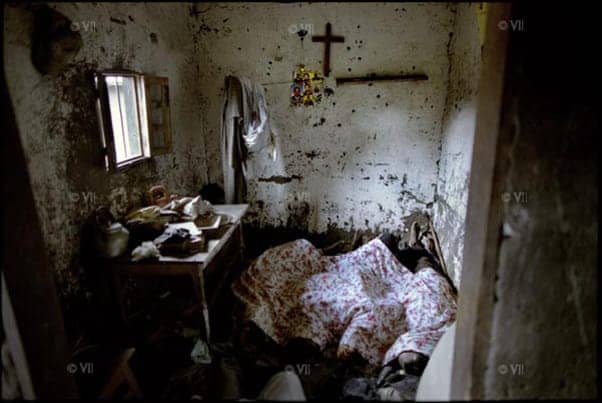 On April 11, 2012, Congolese president Joseph Kabila made a public statement indicating that Ntaganda should be arrested, yet he has shied away from turning him over to the ICC and says that he believes the Congolese justice system will be able to try him.
On April 11, 2012, Congolese president Joseph Kabila made a public statement indicating that Ntaganda should be arrested, yet he has shied away from turning him over to the ICC and says that he believes the Congolese justice system will be able to try him.
The United Nations tried to bring attention to the issue of impunity when it released the Mapping Exercise Report, showing that making systematic changes will ultimately be more impactful to improve the situation than trying individuals responsible for war crimes.
While Congolese applaud the fact that Bosco Ntaganda has been indicted by the ICC, we urge you to look beyond Ntaganda to concentrate on ending the impunity rampant in the Congo, where the warlords of yesterday and frequent human rights abusers are promoted to government positions or army ranks. The United Nations tried to bring attention to this issue when it released the Mapping Exercise Report, showing that making systematic changes will ultimately be more impactful to improve the situation than trying individuals responsible for war crimes.
2. United Nations Mapping Exercise report
On Oct. 1, 2010, The U.N. Office of the High Commissioner for Human Rights released a 550-page report called “Mapping Exercise,” documenting 617 alleged violent incidents of “the most serious violations of human rights and international humanitarian law committed within the territory of the Democratic Republic of the Congo between March 1993 and June 2003.” The report also identifies countries “that could be held responsible for serious violations of human rights committed by their national armies during the period under consideration in the DRC, and in particular Uganda, Rwanda, Burundi and Angola.”
It singled out the crimes committed by the Rwanda army by noting that “the apparent systematic and widespread attacks described in this report reveal a number of inculpatory elements that, if proven before a competent court, could be characterized as crimes of genocide.”
Why did the United Nations decide to produce yet another report on human rights violations in the Congo? The discovery of three mass graves in North Kivu in 2005 was a stark reminder to the United Nations that the past human rights violations in the Congo remained largely uninvestigated. This prompted the U.N. to reactivate earlier U.N. investigative efforts but on a much larger scale.
The Mapping Report notes that the ICC is the only judicial mechanism that has the capacity, the integrity and the independence required to prosecute those who bear the greatest responsibility for the crimes – as defined by international law – committed on DRC territory. It adds that “charges filed and the proceedings [at the ICC] neither do justice to the hundreds or even thousands of victims, nor reflect the true scale of the criminal activities of the accused, documented in numerous prior inquiries.”
“(C)harges filed and the proceedings [at the ICC] neither do justice to the hundreds or even thousands of victims, nor reflect the true scale of the criminal activities of the accused, documented in numerous prior inquiries.”
The report also brings attention to the fact that there are few or no charges relating to acts of sexual violence in the arrest warrants issued by the ICC. It states that this “only contributes to minimizing the importance of these crimes and to confirming a culture of impunity that the Court was intended to overcome.” It also points to the contradiction that, in the Bosco Ntaganda and Thomas Lubanga’s cases, there are no charges for sex crimes whilst those against Germain Katanga and Mathieu Ngudjolo Chui do include such charges.
Understanding the role the ICC can play in supporting justice for the many victims of the political conflict in the Congo, we believe that an equitable application of justice will help to enhance the legitimacy of the court and create better cooperation from member countries throughout the world.
3. Equitable application of justice
Some of the major drivers of the conflict and atrocities in the Congo have not been held to account. There is no indication that the ICC has any intentions of holding neighboring countries responsible for the crimes they have committed or sponsored in the Congo per the U.N. Mapping Exercise Report. Take the case of Thomas Lubanga, for example. He was supported by both Rwanda and Uganda as he recruited child soldiers and committed atrocities in the Congo, but neither the leaders of Rwanda or Uganda have been held accountable for being sponsors and accessories to the crimes committed by Lubanga.
Thomas Lubanga was supported by both Rwanda and Uganda as he recruited child soldiers and committed atrocities in the Congo, but neither the leaders of Rwanda or Uganda have been held accountable for being sponsors and accessories to the crimes committed by Lubanga.
The leaders of nations who are in the good graces with the West and serve Western interests are often given a pass. The current prosecutor, Luis Moreno Ocampo, gave Congolese victims hope when they found out that “at a July 2003 news conference, Mr. Moreno-Ocampo announced out of the blue that he ‘believed’ atrocities in Congo, a member state formerly known as Zaire, could qualify for an ICC investigation.” This hope was lost when, in a June 8, 2006, article in the Wall Street Journal titled “Justice Delayed – For Global Court, Ugandan Rebels Prove Tough Test,” it was reported that “an agreement emerged” for Uganda not to be tried for crimes committed in the Congo.
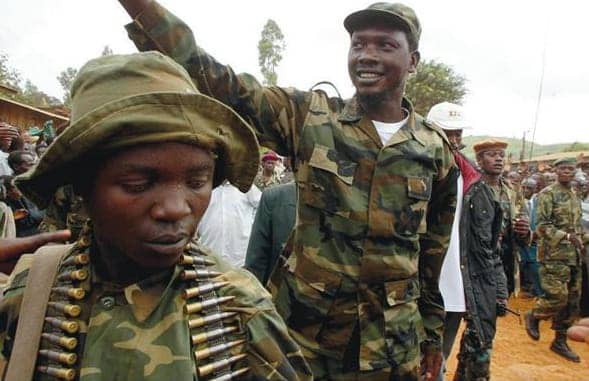 It is also important to note that, in 2005, the International Court of Justice (ICJ) found Uganda liable for what amounted to war crimes – plunder, mass rapes and massacres – when Uganda occupied parts of Congo from 1997 to 2003. Because of this, the court awarded Congo $10 billion to be paid by Uganda for reparations and damages. The ICJ case has been referred to the ICC, and it has yet to be reviewed so that investigations may begin.
It is also important to note that, in 2005, the International Court of Justice (ICJ) found Uganda liable for what amounted to war crimes – plunder, mass rapes and massacres – when Uganda occupied parts of Congo from 1997 to 2003. Because of this, the court awarded Congo $10 billion to be paid by Uganda for reparations and damages. The ICJ case has been referred to the ICC, and it has yet to be reviewed so that investigations may begin.
4. Prescriptions
In order to enhance the legitimacy of the court, the ICC has to deal with those who are culpable in a more equitable fashion. Our hope is that the ICC and international bodies support the U.N. Mapping Exercise Report and the 2005 ICJ ruling. They represent efforts to end the culture of impunity, to provide justice for the victims, and to create a framework for accountability for mass crimes committed and still being committed in the Congo. We believe it is imperative to implement the recommendations listed on the U.N. Mapping Report as a means to deliver justice for the Congolese people and support a more equitable and just process for indictment of individuals and multinationals aiding, abetting or committing the crimes in the Congo.
Over 200 Congolese organizations and human rights groups have called for the United Nations to establish an international tribunal to prosecute the crimes against humanity, war crimes and possible genocide committed in the Congo. They recommend that we:
1. Establish new general policies of justice that would build on the creation of several complementary mechanisms, judicial and non-judicial;
2. Establish accountability measures in public institutions that would result in the removal from management of people such as Gen. John Bosco Tanganda and Gen. Numbi, who are accused of serious violations or attacks against human rights defenders, so that they can face prosecution;
3. Institute appropriate mechanisms to ensure justice and shed light on crimes and massive violations of human rights denounced in the report, including:
(i) The creation of special courts or special chambers within the Congolese courts;
(ii) The creation of a new Truth and Reconciliation Commission,
(iii) The establishment of compensation programs for victims, and
(iv) True and thorough reforms of the entire security sector – army, police and justice system.
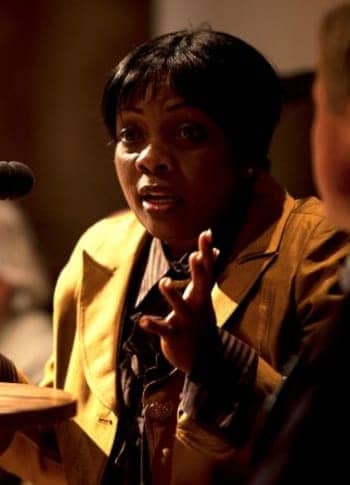 4. Create a regional reconciliation mechanism of the peoples of the Great Lakes region, which will accelerate the free movement of people in the region, facilitate cross-border trade, strengthen judicial cooperation and demilitarize public services at the borders;
4. Create a regional reconciliation mechanism of the peoples of the Great Lakes region, which will accelerate the free movement of people in the region, facilitate cross-border trade, strengthen judicial cooperation and demilitarize public services at the borders;
5. Support a regional accountability and reconciliation mechanism to address issues of impunity and lack of justice.
Given what I have shared with you, I want to now tell you a bit about me and why I am a justice seeker for the Congolese people. I came to the United States in the late ‘90s when my family was granted political asylum as the second Congo war began. I rarely speak about my family and what we experienced while living in the Congo, but I’d like to share with you a nightmare that I’ve had almost every week since probably 2008.
The dream always starts as I am walking down the side of the road with thousands of people carrying their belongings heading toward what I presume to be a safer place. The road is familiar and I’m surrounded with people who seem to be displaced from their homes. On my left, there is a little stream down a short hill. Across the stream, there are trees all along the path. People are conversing, moving slowly and calmly.
Then I hear a scream from somewhere in the crowd. I can’t tell if it is coming from the front or the back. I look around and I see people running toward me. The screams intensify and now everyone is running. I see people trying to run with their belongings and then decide to drop them to run faster.
I look back as I run and I see blood splash and people in military uniform just cutting people with machetes. I pass a few people … I’m scared … I’m sweating. I’m also feeling guilty about people I’ve passed as I look back and see them lying in blood and their limbs all over.
I run over a hill to hide. Someone follows me to hide where I am. As I look up to see what is happening on the road, I can see the fear in people’s faces. I see that fear where you know it’s pointless to run but you are running anyway in hopes that you will survive. I hide again and move closer to the stream and the person hiding with me gets closer to me as if he knows we both will be safe.
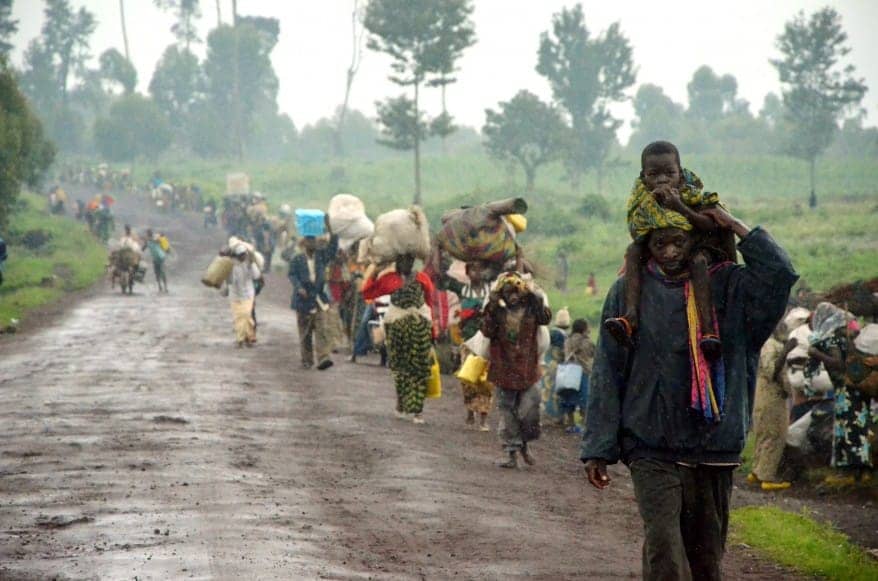 Suddenly a man in uniform somehow sees us, comes over to where we are, raises his machete and hacks the helpless guy with the weapon over and over again. I can see the assailant’s face. He is determined … calm … and he has this look as if he is on a mission … as if he is trying to pass a test … yes … he has a face of someone taking a test.
Suddenly a man in uniform somehow sees us, comes over to where we are, raises his machete and hacks the helpless guy with the weapon over and over again. I can see the assailant’s face. He is determined … calm … and he has this look as if he is on a mission … as if he is trying to pass a test … yes … he has a face of someone taking a test.
I hope you can visualize how when students are taking a test in a classroom they are so determined to pass the test that they have a very serious look on their faces and there is a complete silence in the room. The look of the assailant is comparable to the look of these students in the classroom. He is determined … to kill.
As I watch him, all I can think about is that I am … next. Then the guy looks up to where I am sitting in total fear and it seems that he can’t see me even though he is looking straight at me. He climbs up the hill and keeps going and hacking more people with his machete. I look up, and I see people I know just being cut into pieces. I start saying to myself, “Oh God … Oh God … Oh God!” Then, I wake up.
This dream is the burden of my conscience because of the ongoing realities in Congo. This is what thousands have experienced, according to the U.N. Mapping Exercise Report. The killings haven’t stopped. Today we still have people running for their lives so they won’t be killed. It is our responsibility to support the Congolese victims in their pursuit of justice so that the dreams of the Congolese will be ones of peace and justice, not of fear and atrocity.
With the new commitment of the United States government to prevent mass atrocities and genocide around the world, there needs to be a serious and unified push to raise the profile of the Congo. Congolese people have seen an estimated 6 million of their citizens perish in an unjust war. They have witnessed how the perpetrators of these crimes still roam the streets of their country or are given humanitarian awards and accolades.
Congolese people have seen an estimated 6 million of their citizens perish in an unjust war. They have witnessed how the perpetrators of these crimes still roam the streets of their country or are given humanitarian awards and accolades.
It is absolutely necessary that when we talk about “Never again,” we not only reference the Jewish Holocaust or the Rwandan Genocide but the continued instabilities that make broad-scale violence possible and seed the conditions leading to genocide. The Congolese people deserve justice for the millions they have lost. We hope that all justice seekers around the world will join us in working to deliver justice to the Congolese people.
To learn more about the situation in the Congo, visit http://congojustice.org to view “Crisis in the Congo: Uncovering the Truth.”
Kambale Musavuli, a Congolese native, is spokesperson and student coordinator for Friends of the Congo. He can be reached at kambale@friendsofthecongo.org. You can follow him on twitter @kambale and like his Facebook page at http://www.facebook.com/kambalemusavuli.
The post Justice for the Congolese people, an attainable goal in 2012 appeared first on San Francisco Bay View.